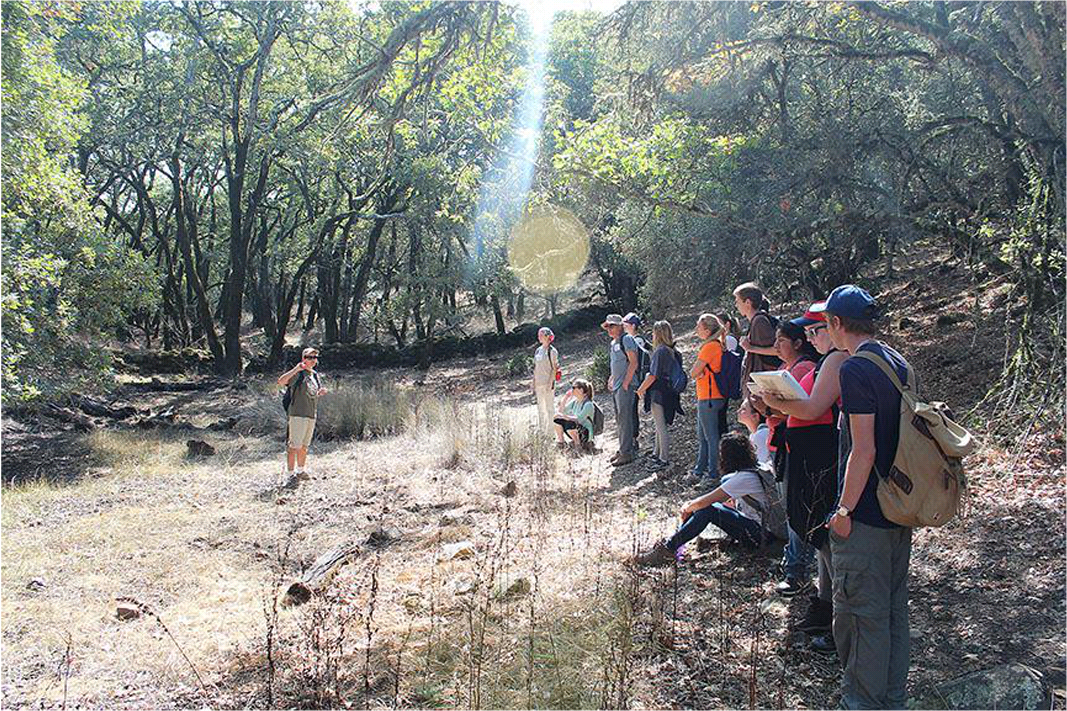 Sonoma Mountain Connection (SMC), as part of a larger proposal to the Koret Foundation, has been awarded $1 million over 4 years. SMC is designed as a two-year cohorted program for STEM students with the aim to reduce the dropout rate for first-time, first-year STEM majors by giving them outdoor research experiences. Students would begin together at the start of their first year and continue through their sophomore year. The program proposes a summer research immersion experience at Fairfield Osborn Preserve and an enriched academic year experience with a pre-determined set of classes for students who are statistically more likely to drop out of STEM fields and university altogether.
Sonoma Mountain Connection (SMC), as part of a larger proposal to the Koret Foundation, has been awarded $1 million over 4 years. SMC is designed as a two-year cohorted program for STEM students with the aim to reduce the dropout rate for first-time, first-year STEM majors by giving them outdoor research experiences. Students would begin together at the start of their first year and continue through their sophomore year. The program proposes a summer research immersion experience at Fairfield Osborn Preserve and an enriched academic year experience with a pre-determined set of classes for students who are statistically more likely to drop out of STEM fields and university altogether.
From the original proposal:
Sonoma Mountain Connection (SMC) will create signature learning experiences that improve retention and graduation rates of first- and second-year STEM majors. The program targets first-time, first-year STEM students, a population with a higher dropout rate than students in other majors. SMC will allow SSU to build on existing efforts to support first-time, first-year students through the Educational Opportunity Program (EOP) and PUERTA (SSU’s Preparing Under-Represented Educators to Realize their Teaching Ambitions Title V grant focused on increasing the pipeline for Latinx teachers). It will also expand and target support for students majoring in the sciences. These students are a key area of focus in Sonoma State’s strategic plan, which seeks to improve retention and graduation rates and eliminate all equity gaps.
SMC builds on the success of Koret Scholars and our recent expansion of high-impact Summer Bridge programs for first-generation, low-income students. As part of our support for our increasingly diverse student population, SSU has doubled our EOP Summer Bridge over the past two years to now serve 250 incoming first-year students each summer. The results are astounding: our retention rates for participating students are already higher than those of students of similar demographics who do not have the opportunity to attend a cohorted program and be scheduled into classes together over the academic year. More data will emerge as we continue to study these cohorts, but early results are extraordinarily promising.
SMC integrates three of the highest-impact educational practices documented to improve academic success: cohorting, research experiences, and outdoor learning. As seen in Summer Bridge and cohort programs across the country--and as practiced through our stretch English and Math classes at SSU and across the CSU system--helping students form a cohort and scheduling them into some classes together over their first and second years can make the difference between persisting and dropping out.
Similarly, involving students in hands-on research is a proven high-impact practice that leads to increased college persistence and higher graduation rates. SMC will combine research experiences with social immersion in the outdoors, a second proven technique for increasing student retention. In outdoor settings, students develop social rapport with each other and their instructors. This helps to ease the transition to college life as students build a network that supports them through the challenges of university life while providing them with a strong sense of belonging.
[...]
Students will take regional field trips, conduct experiments related to water quality, habitat restoration, fire recovery, and fish and wildlife conservation. Working with faculty mentors, students will be introduced to the complex set of skills (e.g., sound science, critical thinking, a commitment to social justice, and effective communication) required to solve today’s biggest social and environmental problems.
SMC will begin with a cohort of 24 students pursuing biology majors. The program will scale up over the next four years, adding computer science majors in year 2, engineering science majors in year 3, and students from other STEM majors in year 4. By the third summer, this means that SMC will be serving 240 first-year students and 144 second-year students.
